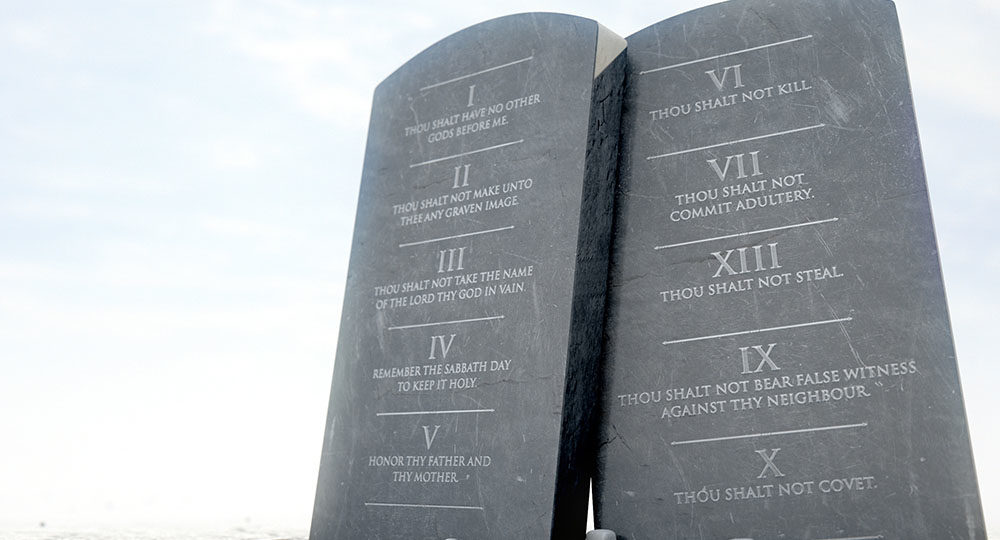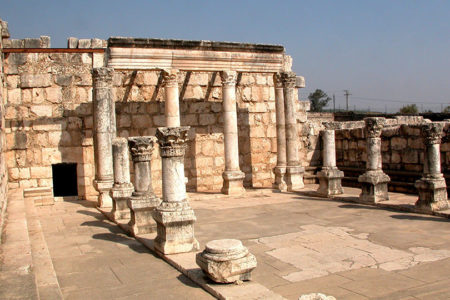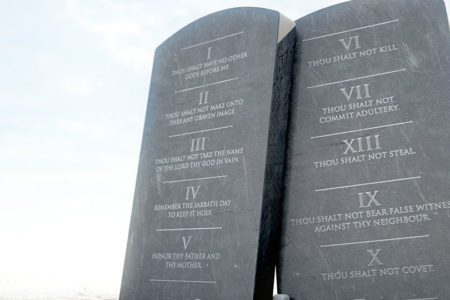But I Say Unto You: Matthew 5:21–48
Swimming pools become graveyards for many young children each summer. To prevent these needless tragedies, some municipalities require fences around pool perimeters. Some pool owners take the additional safety measure of installing another barrier on the sidewalk immediately surrounding the pool, which is uniquely designed to keep children away from the water. The two fences make drowning accidents less likely.
Similar fences were known in Jesus’ time. Those barriers were built, not to keep the unwary from drowning, but to prevent people from breaking God’s laws. If one fence was good, two fences must be better. The one barrier that every Jewish person knew was the Law of God. This body of revelation, called the Torah, comprises the first five books of the Old Testament. By obeying these laws, a person remained pure and holy. The Torah prevents mankind’s violation of God’s holiness.
A second fence was erected to protect the Israelites from disobeying God. Known as the Oral Law, this body of legislation was believed to have originated from God on Mount Sinai. Not until 200 A.D. did Jewish rabbis finally put the verbal laws, which they had received by tradition, into written form, known as the Mishnah. In the New Testament, the Oral Law is called “the tradition of the elders” (Mt. 15:2; Mk. 7:5). Although the Oral Law began with pure motives of obedience to God, these traditions of men eventually became more important than the written laws of God.
In the Sermon on the Mount, Jesus contrasted these oral traditions with the true intent of God’s Word. “Ye have heard that it was said” (5:21), Jesus stated, referring to the Jewish traditions that the rabbis spoke in synagogues. He was not contrasting His message with the Old Testament, for He clearly stated, “Think not that I am come to destroy the law, or the prophets; I am not come to destroy, but to fulfill” (Mt. 5:17). Instead of helping God’s people obey His holy Word, the Pharisees missed the true intent of the Word. Their fence around God’s laws was not high enough. They set their goals too low. By obeying a superficial standard, many Jews felt righteous when, in fact, they were far from it.
Matthew records five examples of Jesus correcting false interpretations of God’s Word. These laws were part of the Mosaic covenant. Believers living in the church age, although not under the Mosaic covenant, obey the same moral principles of that old covenant, “That the righteousness of the law might be fulfilled in us, who walk not after the flesh, but after the Spirit” (Rom. 8:4). Jesus fulfilled the Mosaic Law for us so that the holy standard of God’s law might be fulfilled in us. Only when we walk after the Holy Spirit will we “exceed the righteousness of the scribes and Pharisees” (Mt. 5:20).
Murder
The first tradition Jesus confronted is well-known: “Thou shalt not kill” (Ex. 20:13; Dt. 5:17), God’s sixth commandment, which prohibited murder. His next words exposed the true intent of God’s Word (5:22). Refraining from murder did not exhaust this command. He described three actions that will bring the judgment, not of a human court, but of Almighty God. Anger against another believer and personal insults, such as calling another “Race” (an Aramaic word for imbecile) or “fool,” will be judged by God. Since Jesus Himself called some people “fools” (Mt. 23:17), it is only sinful anger motivated by selfishness that Jesus condemned. This type of verbal abuse must have been well known in Jewish religious circles during Jesus’ time. Even the Jewish Talmud contains accounts of famous rabbis who called their antagonists “Race” and “fools.”*
The proper attitude will be seen in our worship and in our conflicts with others (5:23–24). If we know that another believer has something against us, we must stop our worship and amend the situation. It is far better to postpone our devotions than to postpone our reconciliation. If another person threatens us, the proper attitude is, again, reconciliation, not retaliation (5:25–26). Listen to Jesus’ words echoed by His apostle: “Whosoever hateth his brother is a murderer; and ye know that no murderer hath eternal life abiding in him” (1 Jn. 3:15).
Adultery
Jesus moved on to the common interpretation of God’s seventh of the Ten Commandments (Ex. 20:14; Dt. 5:18), “Thou shalt not commit adultery.” He expanded the superficial Jewish viewpoint by including lustful thoughts as the seeds of adultery. What did Jesus intend for His followers to do with their offending eyes or hands? Nothing less than radical amputation of the sinful flesh would deliver us from hell. These figurative words point to a deeper truth. A life of sensual fulfillment will lead to eternal destruction. The only hope is a change of heart and lifestyle. Today’s society glorifies illicit sex. We allow ourselves to be entertained by a media tolerant of it. Our God hates it.
Jesus’ apostles continue His theme: “Mortify [put to death], therefore, your members which are upon the earth: fornication, uncleanness, inordinate affection, evil desire, and covetousness (which is idolatry), For which things’ sake the wrath of God cometh on the sons of disobedience” (Col. 3:5–6).
Divorce
The Pharisees had formulated a doctrine of divorce based on Deuteronomy 24:1: “Whosoever shall put away his wife, let him give her a writing of divorcement” (5:31). Two leading rabbis who lived during Jesus’ day swayed Jewish opinion about divorce. Rabbi Hillel taught that a man could divorce his wife for any cause, while Rabbi Shammai held that only adultery could break the marriage.* Jewish law required that a man divorce his wife for adultery. Such teaching fractured families and multiplied divorces. Jesus taught that improper divorce produces the sin of adultery. The only exception to Jesus’ teaching was “fornication” (5:32), the practice of sexual immorality.
Easy divorce is as common in the 20th century as it was in the first. Instead of working out their problems, many couples excuse themselves from their vows. God desires lifetime loyalty and love for each other from husbands and wives.
Truthfulness
Jesus next summarized God’s words from several passages (Lev. 19:12; Num. 30:2; Dt. 23:21–23), “Thou shalt not perjure thyself, but shalt perform unto the Lord thine oaths” (5:33). Swearing does not refer to the use of vulgar words, but to the calling upon God to judge if the words spoken are false. These good words of God had been contorted into a license to lie. First-century Jews believed that only certain oaths bound people to tell the truth. Other oaths that contained subtle distinctions rendered them nonbinding. A person could tell a lie yet cover it with a spiritual-sounding oath. Jesus cursed those ludicrous oaths: “Woe unto you, ye blind guides, who say, Whosoever shall swear by the temple, it is nothing; but whosoever shall swear by the gold of the temple, he is a debtor! Ye fools and blind; for which is greater, the gold, or the temple that sanctifieth the gold?” (Mt. 23:16–17). Although later Jewish rabbis warned of idle oaths, they never forbade them. An entire tractate in the Mishnah, Shebuoth, is devoted to the topic of swearing oaths.
Our Savior clearly forbade taking oaths that were designed to deceive. James echoed Jesus’ words, “But above all things, my brethren, swear not, neither by heaven, neither by the earth, neither by any other oath; but let your yea be yea, and your nay, nay, lest ye fall into condemnation” (Jas. 5:12). This has no reference to oaths taken in court, since they are not intended to conceal the truth but to reveal it. Let your word be your bond. “Yes” must mean “yes.” “No” must mean “no.” Christians must be known for the truth.
Retaliation
The familiar words, “An eye for an eye, and a tooth for a tooth” (5:38; cp. Ex. 21:24; Lev. 24:20; Dt. 19:21) were well-known in Jesus’ time as well. They provided Israel’s judicial system with a law against excessive retaliation. God desired the punishment to fit to the crime and no more. But the Jewish leaders of the first century twisted this limitation of reprisal into a command for personal revenge.
Jesus listed four examples to shock people out of their traditional interpretation. First, a person may strike another’s right cheek (Mt. 5:39). For a right-handed person to strike another’s right cheek involved something other than a fist fight. The backhanded slap made the blow an insult. Such personal insults, said Jesus, must be ignored. Paul declared, “Recompense to no man evil for evil … avenge not yourselves but, rather, give place unto wrath; for it is written, Vengeance is mine; I will repay, saith the Lord” (Rom. 12:17, 19). Second, an evil person may sue another for his clothing (5:40). Jesus commands that His followers give even more. Selflessness must be seen among believers. Paul chided the church in Corinth: “Now, therefore, there is utterly a fault among you, because ye go to law one with another. Why do ye not rather take wrong? Why do ye not rather allow yourselves to be defrauded?” (1 Cor. 6:7). Third, a Roman soldier could force a person to carry his luggage a certain distance (Mt. 5:41). Complaint against the government is tempting, but Jesus demands the opposite. Finally, give to the person who wishes to borrow money (5:42). In these instances, believers display the true treasure of their hearts through generosity.
Love
God’s Word states in Leviticus 19:18, “thou shalt love thy neighbor.” The command to “hate thine enemy” is not found in the Old Testament. It comes from Jewish tradition. A person’s “neighbor” was a fellow Jew; the “enemy” was the Gentile. Such a radical command can only be practiced by those who are “sons of your Father, who is in heaven” (Mt. 5:45). He sends sunshine, and rain to all people alike. To be like Him, His children must love their enemies and pray for them.
Faithful Christians are known by their love to all people. “Love worketh no ill to its neighbor; therefore, love is the fulfilling of the law” (Rom. 13:10). “If ye fulfill the royal law according to the scripture, Thou shalt love thy neighbor as thyself, ye do well” (Jas. 2:8). “To return evil for good is devilish; to return good for good is human; to return good for evil is divine.”* Our goal is nothing less than to be “perfect” (Mt. 5:48). It is only through a new heart obtained by faith in the Messiah, Jesus, that we can obey God perfectly. That perfection will not be achieved until glory, yet we must strive to reflect the perfect one whom we call “[our] Father, who is in heaven.”








